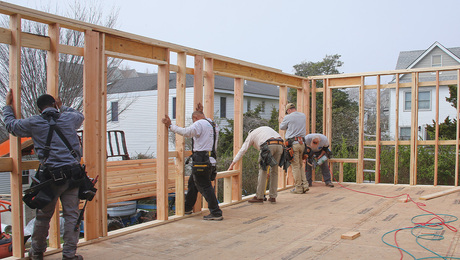*
I just bought a house this weekend that currently has a finished basement. The problem is that it is “dated” . I am going to gut it and start over. My question is when I put up new stud walls should I use a vapor barrier on the interior side or the exterior side. There is absoulutely no sign of moisture anywhere. Also can I put the stud walls against the concrete walls or should there be an inch or two of space? Thanks for the help. Bill
Discussion Forum
Discussion Forum
Up Next
Video Shorts
Featured Story

A rear addition provides a small-scale example of how to frame efficiently.
Featured Video
Builder’s Advocate: An Interview With ViewrailRelated Stories
Highlights
Fine Homebuilding Magazine
- Home Group
- Antique Trader
- Arts & Crafts Homes
- Bank Note Reporter
- Cabin Life
- Cuisine at Home
- Fine Gardening
- Fine Woodworking
- Green Building Advisor
- Garden Gate
- Horticulture
- Keep Craft Alive
- Log Home Living
- Military Trader/Vehicles
- Numismatic News
- Numismaster
- Old Cars Weekly
- Old House Journal
- Period Homes
- Popular Woodworking
- Script
- ShopNotes
- Sports Collectors Digest
- Threads
- Timber Home Living
- Traditional Building
- Woodsmith
- World Coin News
- Writer's Digest


















Replies
*
I like to give an inch, more to make it easier to plumb wall. It allows you a cushion if existing wall is out of plumb or has a bulge. Also, treated wood should be used in contact with concrete, the inch allows you to use reg. framing lumber, pressure treated plates.
Doesn't anyone use metal studding? It is the only way to go IMHO.
*Barewoods:Scroll down and checkout a discussion regarding this very issue entitled: Finishing Out Basement Walls--started by Ed Gregg. Thor
*If you have a very dry basement with a good sealing coat of paint on the masonary walls you could probably get away without a vapor barrier. if you do have some water showing, you need to fix that first for the best long term results. If you wish to use a vapor barier, put it directly onto your studs or furring strips so as to allow some airflow between the barrier and the concrete/block wall. As for the rest, I would use 1x3 furring strips right over the block (providing the walls are block and straight). fur along the bottom first with pt lumber (1x6) and leave the tops open to provide the airflow. I also prefer drop ceilings so that you will have access to all the mechanical work above it without having to knock holes in the drywall.Pete Draganic
*
I just bought a house this weekend that currently has a finished basement. The problem is that it is "dated" . I am going to gut it and start over. My question is when I put up new stud walls should I use a vapor barrier on the interior side or the exterior side. There is absoulutely no sign of moisture anywhere. Also can I put the stud walls against the concrete walls or should there be an inch or two of space? Thanks for the help. Bill